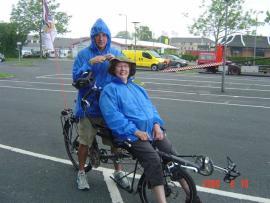In 2007, local paediatric rheumatologist, Dr Chris Scott summitted Mount Kilimanjaro even though he has the arthritic condition, ankylosing spondylitis, which attacks the joints in the spine. He celebrates World Arthritis Day this year, having participated in the 2009 Biking Against Rheumatism in Europe Cycle Challenge.
When one looks at Dr Scott today, it is hard to believe that this fit 35 year old man was so crippled by arthritis a few years ago that he was unable to work for eight months while he was qualifying as a paediatric registrar at the Red Cross Children’s Hospital.
Having shown no response to the conventional treatment used to treat inflammatory arthritic conditions, he eventually persuaded his medical scheme, with great difficulty, to fund biologic treatment. He had a complete turnaround and celebrated his recovery by not only returning to work, but also making physical fitness part of his rehabilitation programme.
Having recently been sponsored by Roche Pharmaceuticals to cycle from Brussels to Copenhagen in the 2009 Biking Against Rheumatism in Europe (BARIE) cycle rally, it is now part of Scott’s personal mission to continue participating in high profile sporting events in order to publicise arthritis as a disease - and the fact that there is life after arthritis.
From Brussels to Copenhagen
Since 2007, the "Biking against rheumatism" event has coincided with the annual European League against Rheumatism Conference (EULAR). Bikers with arthritis cycle between Brussels and the city hosting the EULAR congress.
This year, they cycled from Brussels to Copenhagen and in 2010 they will be cycling from Brussels to Rome over the Alps.
"BARIE participants range from extremely fit and well-trained cyclists to patients who need crutches and assistance just to get around," says Scott. "Patients and caregivers are teamed up so that able-bodied people can assist those who are disabled by either sharing a tandem bicycle, or a specially converted and recumbent bicycle called a 'pinot'.
Chris and his partner, Marleen Vansteenkiste
"Cycling on a pinot with someone who is not able to contribute much is extremely hard work, especially going uphill or into a strong wind," says Scott. "By sharing the burden and the challenge, doctors, nurses and physiotherapists develop a deep insight into, and empathy for the daily difficulties of patients with arthritis."
5 days, 60km per day
The 2009 BARIE cycle challenge spanned five days and a distance of 667 km. To get to Copenhagen, the bikers travelled through Belgium, Holland, Germany and Denmark.
The group included 50 patients, with another 30 participants comprising family members, a few children, rheumatologists and allied healthcare workers.
Scott partnered with lupus patient, Marleen Vansteenkiste, and they used a pinot, with Scott sitting in the traditional upright position.
The participants didn’t cycle all the way. "A bus took us some of the distance, but it was still very challenging," says Scott. "We cycled about 60 km per day, and due to the limitations of the cyclists and the traffic congestion caused by so many bikes, it generally took us about eight hours per day to get to our next location.
"We kept the speed at 16 km/h, so we did roughly four to five hours of cycling per day, taking 15-minute stops after each section to enjoy drinks & snacks. The terrain was mainly flat, but Day Four in Germany was quite mountainous and steep. However, the bus was always behind or just ahead of us, so if people couldn’t manage, they could hop on the bus again."
Scott says that there was also enough rain and wind to provide some challenging circumstances for the cyclists. "At one point in Germany, we were totally soaked," he remembers.
"We saw Belgium, Holland, Germany and Denmark from a different perspective, cycling through country lanes, along canals and through big cities. Wonderful!"
Although Scott says that cycling through Europe was less challenging than climbing Mt Kilimanjaro, he concedes that his backside took severe strain and that it took a while to recover.
Cycling good for arthritis sufferers
Cycling is good for arthritis sufferers, Scott says, because it is a closed chain exercise where there is no impact stress on the joints.
"Cycling can improve and maintain joint mobility. It is also a social sport, which takes one outside into the open air and sunlight, which is good therapy against osteoporosis."
Having cycled this year with two other arthritis patients from Pretoria, Scott is hoping that more South African delegates will participate in next year’s BARIE event.
"I am passionate about the plight of people who suffer silently in our society from 'invisible' diseases like arthritis," he says. "Having suffered myself in the past, I am acutely aware of how little recognition and support patients with rheumatic diseases generally get from society and well meaning, but ill informed healthcare workers."
(Information compiled for The Arthritis Foundation of South Africa by Linda Trump of Cat Communications.)
(October 2009)




 Publications
Publications
 Partners
Partners














